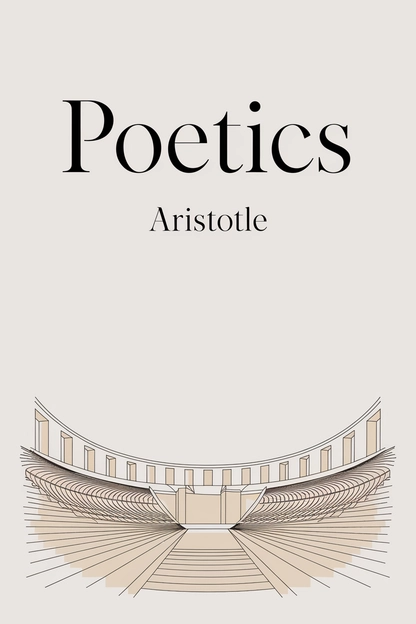
Poetics
by Aristotle
Brief overview
This book explores the foundations of dramatic and poetic composition, illustrating how plot, character, and style intertwine to create impactful storytelling. It delves into the purpose of artful imitation, explaining how well-structured narratives can provoke deep emotional responses. By reading it, you will understand the timeless principles guiding both the creation and experience of tragedy, comedy, and epic poetry.
Introduction
Welcome! In these pages, you’ll journey into a timeless guide on how we humans transform life’s chaos into potent works of art. The ideas here were developed centuries ago but remain surprisingly relevant for writers, readers, and anyone moved by powerful stories. Whether you crave a deeper appreciation of classic tragedies or want to sharpen your own craft, settle in for a fascinating exploration of poetic structure, character, and emotional resonance.
This text reveals the hidden architecture beneath memorable tales and clarifies why some narratives linger in our minds while others fade quickly. In short, it promises to teach you about the essential building blocks—plot, character, language, themes—of any stirring work of dramatic or poetic art.
The Roots of Poetic Imitation
All great art begins with imitation. From ancient hymns to modern poems, creators often mimic real life—but not strictly as it is. Instead, they portray it as they want us to see it, sharpening or softening details to reveal deeper meaning. This is the essence of poetic imitation. By rewriting or dramatizing human actions, the poet offers insight into universal experiences, ranging from heartbreak to triumph.
Importantly, imitation is not mere copying. When a playwright or poet imitates, they magnify essential elements—sometimes in vivid language or musical verse—so audiences can better recognize truths or flaws in their own lives. In this sense, imitation becomes both reflection and interpretation.
What is Poetics about?
Immerse yourself in the timeless wisdom of Aristotle's Poetics, a seminal text that has shaped our understanding of drama and literature since antiquity. This profound work elucidates the vital components of storytelling, unveiling how plot, character, and style complement one another to evoke intense emotional responses. At its core, Poetics demonstrates the nuanced art of imitation, shedding light on the philosophies that govern tragedy, comedy, and epic forms, making it an invaluable resource for anyone seeking to understand the dynamics of compelling narratives.
Aristotle artfully argues for the necessity of well-structured narratives, proposing that the arrangement of events is agelessly potent in stirring cathartic experiences. His exploration encompasses the emotional and intellectual impacts literature can exert upon its audience, challenging readers to consider the enduring principles that inform not only the creation but the reception of literary art. This critical work remains relevant, offering rich insights for both creators and audiences intent on delving deeper into the intricate fabric of storytelling.
Review of Poetics
Aristotle's Poetics stands as a cornerstone in the foundations of literary theory, opening a window into the nuanced interplay of structural and thematic elements that characterize classical tragedian works. One of the book’s key strengths is its ability to distill complex ideas about narrative into an accessible form, enabling readers from various backgrounds to grasp the bedrock principles of plot and character development.
Its systematic approach grants clarity on concepts like catharsis while grounding ideas in practical applications, such as how character flaws precipitate drama’s most poignant moments. The text's evergreen nature owes much to its logical exposition and thoughtful comprehensibility, making it a guide for writers looking to refine their craft and enthusiasts keen on enriched literary appreciation.
While translations may impact the tone, Aristotle's original insights maintain their power, encouraging reflection on how we craft and consume stories. From playwrights and authors to students and scholars, this reading engraved its significance across generations, advocating for personal growth through narrative artistry. Consequently, this erudite exploration into the anatomy of storytelling comes highly recommended for those eager to explore the enduring frameworks of drama.
Who should read Poetics?
- Writers and Playwrights: They will find immense value in understanding classical narrative foundations that can improve their storytelling and scriptwriting skills.
- Literary Scholars and Students: This book offers a deep dive into early literary theory, making it essential for academic study in literature courses.
- Theater Enthusiasts: By exploring Aristotle's thoughts on drama, they can gain richer insights into the plays they love, heightening appreciation of classical and modern performances.
- Psychologists and Philosophers: Readers interested in the emotional impacts and ethical dimensions of storytelling will benefit from Aristotle's exploration of catharsis and imitation.
- Cultural Historians: This work serves as a key text in understanding ancient cultural output and its influence on both past and contemporary literary forms.
About the author
Book summaries like Poetics
Why readers love Mindleap
10-Minute Book Insights
Get the core ideas from the world's best books in just 10 minutes of reading or listening.
Curated For You
Discover your next favorite book with personalized recommendations based on your interests.
AI Book ExpertNew
Chat with our AI to help find the best book for you and your goals.
Reviews of MindLeap
Love how I can get the key ideas from books in just 15 minutes! Perfect for my busy schedule and helps me decide which books to read in full.
Alex R.
The summaries are incredibly well-written and the audio feature is perfect for my commute. Such a time-saver!
Jessica M.
Great app for personal growth. The insights are clear and actionable, and I love how they capture the essence of each book.
Chris P.
The app is beautifully designed and the summaries are top-notch. Definitely worth every penny!
Sarah K.

